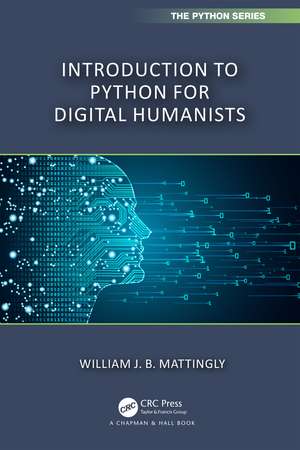Introduction to Python for Humanists: Chapman & Hall/CRC The Python Series
Autor William Mattinglyen Limba Engleză Paperback – 26 iul 2023
Key Features:
- Data analysis
- Data science
- Computational humanities
- Digital humanities
- Python
- Natural language processing
- Social network analysis
- App development
| Toate formatele și edițiile | Preț | Express |
|---|---|---|
| Paperback (1) | 358.51 lei 3-5 săpt. | +29.45 lei 5-11 zile |
| CRC Press – 26 iul 2023 | 358.51 lei 3-5 săpt. | +29.45 lei 5-11 zile |
| Hardback (1) | 945.65 lei 6-8 săpt. | |
| CRC Press – 26 iul 2023 | 945.65 lei 6-8 săpt. |
Preț: 358.51 lei
Nou
Puncte Express: 538
Preț estimativ în valută:
68.61€ • 71.36$ • 56.64£
68.61€ • 71.36$ • 56.64£
Carte disponibilă
Livrare economică 24 martie-07 aprilie
Livrare express 08-14 martie pentru 39.44 lei
Preluare comenzi: 021 569.72.76
Specificații
ISBN-13: 9781032378374
ISBN-10: 1032378379
Pagini: 362
Ilustrații: 25 Line drawings, color; 5 Line drawings, black and white; 46 Halftones, color; 13 Halftones, black and white; 25 Illustrations, color; 64 Illustrations, black and white
Dimensiuni: 178 x 254 x 27 mm
Greutate: 0.63 kg
Ediția:1
Editura: CRC Press
Colecția Chapman and Hall/CRC
Seria Chapman & Hall/CRC The Python Series
ISBN-10: 1032378379
Pagini: 362
Ilustrații: 25 Line drawings, color; 5 Line drawings, black and white; 46 Halftones, color; 13 Halftones, black and white; 25 Illustrations, color; 64 Illustrations, black and white
Dimensiuni: 178 x 254 x 27 mm
Greutate: 0.63 kg
Ediția:1
Editura: CRC Press
Colecția Chapman and Hall/CRC
Seria Chapman & Hall/CRC The Python Series
Public țintă
AcademicNotă biografică
William Mattingly is a 2022 Harry Frank Guggenheim Distinguished Scholar and a 2022-2023 ACLS Grantee for his work as co-principal investigator and lead developer for the Bitter Aloe Project which examines testimonies of violence from South Africa’s Truth and Reconciliation Commission. He is currently the Postdoctoral Fellow for the Analysis of Historical Documents at the Smithsonian Institution’s Data Science Lab. Mattingly currently works on two projects at the Smithsonian. The first is based at the United States Holocaust Memorial Museum (USHMM), where he is developing a robust pipeline of machine learning image classification and natural language processing (NLP) models to automate the cataloging of millions of images. At the Smithsonian, he is working on a project connected to the American Women’s History Initiative. Here, he is developing machine learning and heuristic pipelines with spaCy, a Python NLP library. This pipeline will identify women in Smithsonian documents and automatically extract knowledge about them so that we can better understand the influential role women played at the Smithsonian.
Cuprins
Part I. The Basics of Python. Chapter 1. Introduction to Python. Chapter 2. Data and Data Structures. Chapter 3. Loops and Logic. Chapter 4. Formal Coding: Functions, Classes, and Libraries. Chapter 5. Working with External Data. Chapter 6. Working with Data on the Web. Part II. Data Analysis with Pandas. Chapter 7. Introduction to Pandas. Chapter 8. Working with Data in Pandas. Chapter 9. Searching for Data. Chapter 10. Advanced Pandas. Part III. Natural Language Processing with spaCy. Chapter 11. Introduction to spaCy. Chapter 12. Rules-Based spaCy. Chapter 13. Solving a Domain-Specific Problem: A Case Study with Holocaust NER. Chapter 14. Topic Modeling: Concepts and Theory. Chapter 15. Text Analysis with BookNLP. Chapter 16. Social Network Analysis. Part IV. Designing an Application with Streamlit. Chapter 17. Introduction to Streamlit. Chapter 18. Advanced Streamlit Features. Chapter 19. Building a Database Query Application. Part V. Conclusion. Chapter 21. Conclusion.
Descriere
This book will introduce digital humanists at all levels of education to Python. It provides background and guidance on learning the Python computer programming language. It is designed so that those experienced in Python can teach from it, and those interested in being self-taught can use it.















